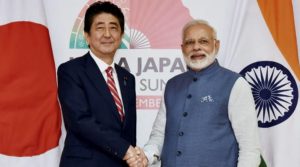
India and Japan have scheduled their first annual bilateral space dialogue in March 2019, where they will discuss cooperation and coordination on a range of civil and national security space issues, ranging from space-based maritime domain awareness and satellite reconnaissance through to the harmonization of positioning, navigation, and timing (PNT) systems and space exploration, according to a report in the Nikkei Asian Review.
The Japan-India Space Dialogue was established in October 2018 by Japanese Prime Minister Shinzo Abe and Indian Prime Minister Narendra Modi. It aims in part to keep pace with the U.S., China and Russia in this area. This move toward sharing satellite data and surveillance technologies, acknowledges the strategic importance of monitoring outer space and the world’s oceans.
The first meeting will focus on the sharing of satellite and radar information as well as ground infrastructure, to bolster the defence capabilities of both countries. At this time, Japan and India each have their own systems for monitoring satellite and ship movements to support their national security needs.
According to the report in the Nikkei Asian Review, India hopes the Japan Aerospace Exploration Agency (JAXA) can help it keep tabs on Chinese troop movements along its northern border. India currently, receives information collected by U.S. reconnaissance satellites but it would like to diversify its sources.
Japan believes that India’s ocean surveillance capabilities can help it track Chinese naval vessels in the South China and East China seas and detect signs of North Korean missile activity.
“The deep pockets of China along with Xi’s strategic vision and leadership have been able to accomplish far greater than what India and Japan could do independently. The collaborative efforts between the two countries could hopefully make a dent in the emerging Asian space security dynamics,” said Dr. Rajeswari Pillai Rajagopalan, Distinguished Fellow and Head of the Nuclear and Space Policy Initiative at the Observer Research Foundation, a think-tank in Delhi, in an email to SpaceWatch.Global.
“The upcoming Japan-India space dialogue and the broader collaboration in space and strategic matters are a direct result of the increasing Asian geopolitical competition,” added Dr. Rajagopalan. “The closer strategic partnership between the two space agencies is a reflection of the comfort level that exist between India and Japan driven by the concerns of the strategic consequences of the growing Chinese military might including in outer space.”
Plans for the Japan-India Space Dialogue also include discussion about tracking space debris, which poses a danger to satellites, weather forecasts, telecommunications and other vital services.
“Maritime Domain Awareness, although not spelt out as such, will remain a significant aspect of the India-Japan cooperation,” said Dr. Rajagopalan. “Surveillance over the Indian Ocean will be key in addition to the surveillance of the East and South China Seas.”
The Space Dialogue could also move India toward its goal to become only the fourth country — after the U.S., former Soviet Union and China — to land on the Moon.
“The Lunar mission is already on the India-Japan space agenda,” Dr. Rajagopalan pointed out to SpaceWatch.Global.
Japan and India are already collaborating in exploring the lunar polar zone. Both countries are currently operating satellite positioning, navigation, and timing (PNT) systems, and the Dialogue will examine opportunities for collaboration in this area as well.
The Space Dialogue delegation from Japan will be headed by the Ministry of Foreign Affairs and the Cabinet Office, and it will include officials from JAXA and other ministries. India’s delegation is expected to be represented by the Ministry of External Affairs, Ministry of Defence and the Indian Space Research Organisation (ISRO).
“Given that the Asian strategic balance is titled in favour of China on most counts, India-Japan cooperation is set to expand manifold in the coming years,” added Dr. Rajagopalan.





